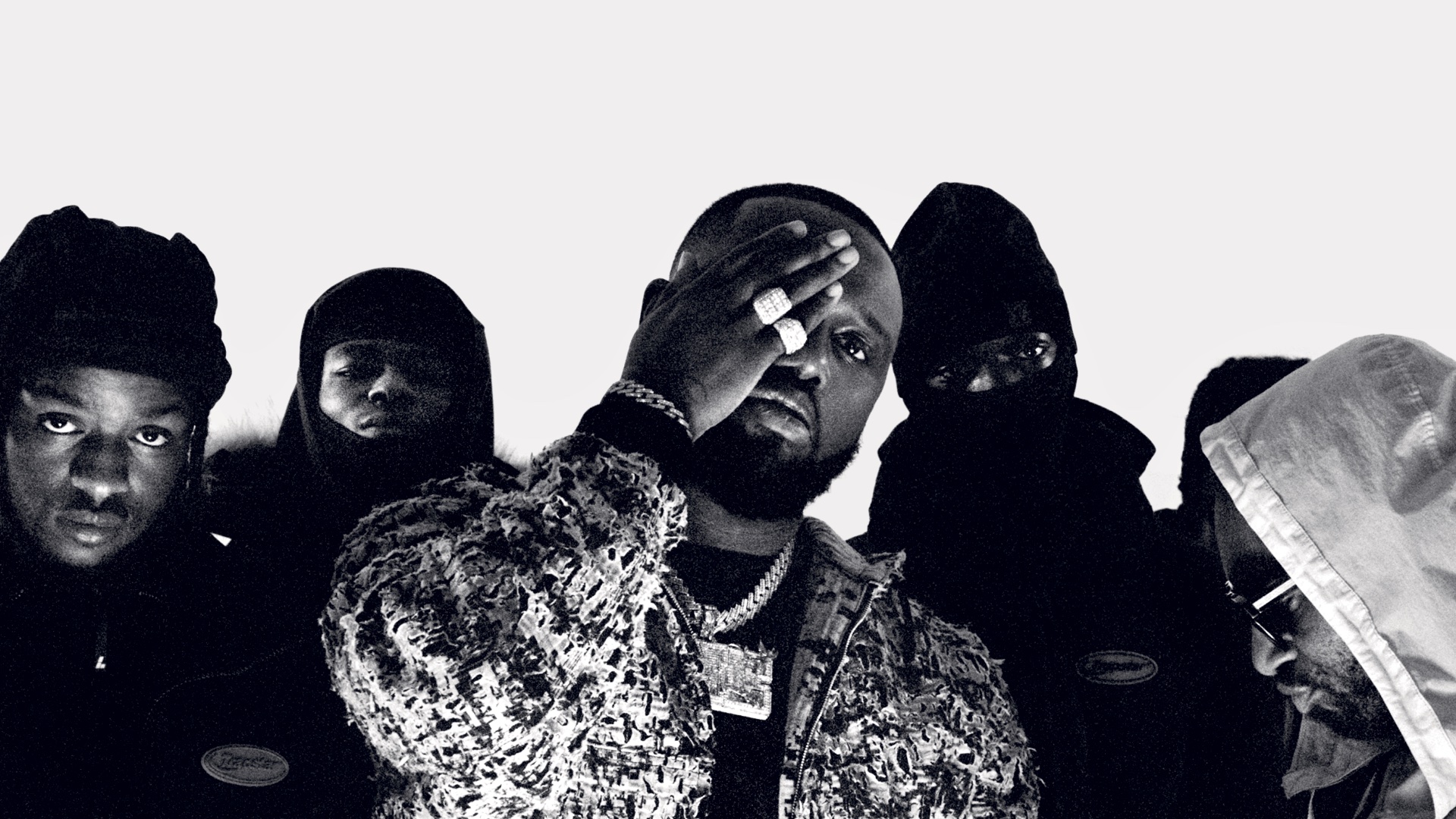This story originally appeared in i-D’s The Timeless Issue, no. 371, Spring 2023. Order your copy here.
It’s a rainy January afternoon in Tottenham, and Headie One is standing in front of the famous waterfall mural painted across a pebbledash housing block in Broadwater Farm. There are groups of young men decked out in ballys and puffer jackets congregating across the concrete, some smoking, some playing with a baby rottweiler. It’s grey, and windy, and it’s the same picture of the Farm that has been culturally crystalised ever since the murals began to appear in the late 80s, when they were commissioned as part of local regeneration programmes. Intended to settle the reverberations of riots that erupted here in response to the death of 49 year-old resident Cynthia Jarrett at the hands of the Metropolitan Police, those programmes – and these murals ̃– were a response to the devastation which first put Broadwater on the national map. The scene presents a fitting backdrop to the music of Headie One: music which intimately narrates the realities of his experiences growing up here. “Apparently all I talk is prison / but I don’t know no different,” he shrugs on “Ain’t It Different”; on “Music x Road”: “I still walk a thin line between music and road.”
Headie – Irving Adjei – is now the leading voice in the UK drill scene: the first to ever enter the Top 10 in a genre that has been unjustly criminalised and wildly mischaracterised by a wave of moral panic that surged in response to its rise at the end of the 2010s. A member of OFB, the expansive Broadwater musical collective which incorporates the likes of RV, Bandokay and Double Lz, and who intermittently had their YouTube channel deleted as a part of censorship crackdowns on the genre, his work has resonated widely, and had a far-reaching impact in spite of mainstream media apathy and opposition.
“People are fickle and short minded, and quick to undervalue people’s art. When I listen to people’s music, I listen to the story they’re trying to tell – it doesn’t have to be the same as mine, but I can relate to what they’re saying and apply how it can relate to my life,” he says. “I feel like it’s a struggle to talk about progress sometimes,” he continues. “Especially in this new era, where music’s become something different to how it was before: more focused on the outcome and less on the story someone’s telling and the importance and significance of how relatable it is to loads of people out there.”
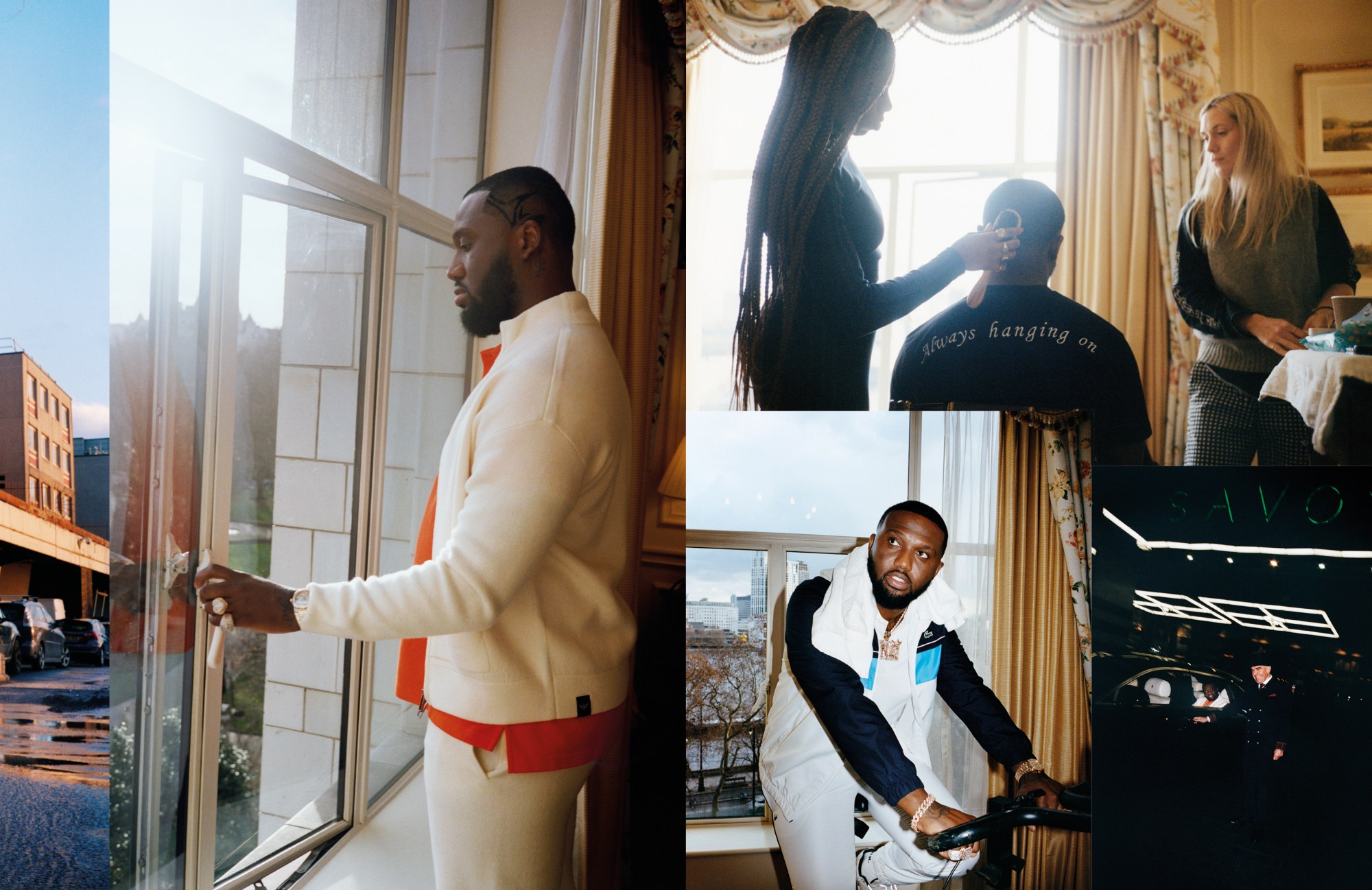
Headie’s music – hard-hitting drill flows that recount his life on road with cinematic panache – has made a profound mark across the UK since he began his ascent. In 2019, Music x Road – his first mainstream mixtape, complete with cameos by the likes of Skepta and Dave – earned him widespread critical renown; in 2020, his debut album, Edna, went straight to Number 1 and saw him crowned “the breakout star of drill.” The plethora of projects he’s released besides – the introspective, transcendent Gang, created with Fred Again and starring the likes of Sampha and FKA Twigs; the No Borders: European Compilation Project which features collaborations with drill artists across the continent, from Luciano to Gazo – have showcased his remarkably broad range – and now, with the release of his hotly-awaited single Martin’s Sofa and a new album set to drop this Spring, he’s set for a new era of success.
“I don’t like to see myself as a role model because I don’t think I’ve always made the best decisions,” he smiles. “But I like to hope that my music can motivate people to make changes in their personal life, no matter what they’re dealing with; that they find some sort of motivation to come out of it and take positive steps forwards. To be able to take a drastic U-turn on what’s expected of people who come from places like (Broadwater Farm) – not just myself, but for everyone.
That’d be my dream, for people to say that they beat the odds and the statistics of what these kinds of communities are supposed to produce. It’s not really a normal thing for people to have a success story, or even progression stories, from these kinds of places. That’s what I’d like to see achieved for all my people.”
Here, photographer Bolade Banjo spends a few days documenting the life of Headie, journeying from Broadwater to Bond Street, while fellow Tottenham native, Headie’s friend and collaborator Skepta, sits down with him to discuss the story so far – and what’s next.
Subscribe to i-D NEWSFLASH. A weekly newsletter delivered to your inbox on Fridays.
Skepta: My first question is: I would look at you as a successful man from Broadwater Farm. A man that’s made it. But when I say that to people, I have to double-check because everyone has a different definition of “made it”. What is yours? What’s “made it” to you?
Headie One: (Pours a drink and starts laughing)
Skepta: Man’s laughing but it’s a serious question! You think it was a joke. (Laughs) He’s always got jokes. Don’t make it into a joke Headie… I can see you smiling. I told everyone you were gonna make me laugh.
Headie: That question will have a different answer whoever it’s asked of. Everyone values different things. I don’t feel like I’ve made it yet. I feel like the stuff I used to dream of, I haven’t fully achieved yet. There’s still a lot of progress to be made. But it’s one step at a time, isn’t it? It’s way better than before, so I’m moving in the right direction. But yeah, “made it”, that’s not a phrase that I’d be able to use in regard to myself.
Skepta: I would personally say that you have. OK, next question. We were talking about Ghana earlier. Did you use to go to Ghana when you were younger?
Headie: I got shipped to Ghana, you know.
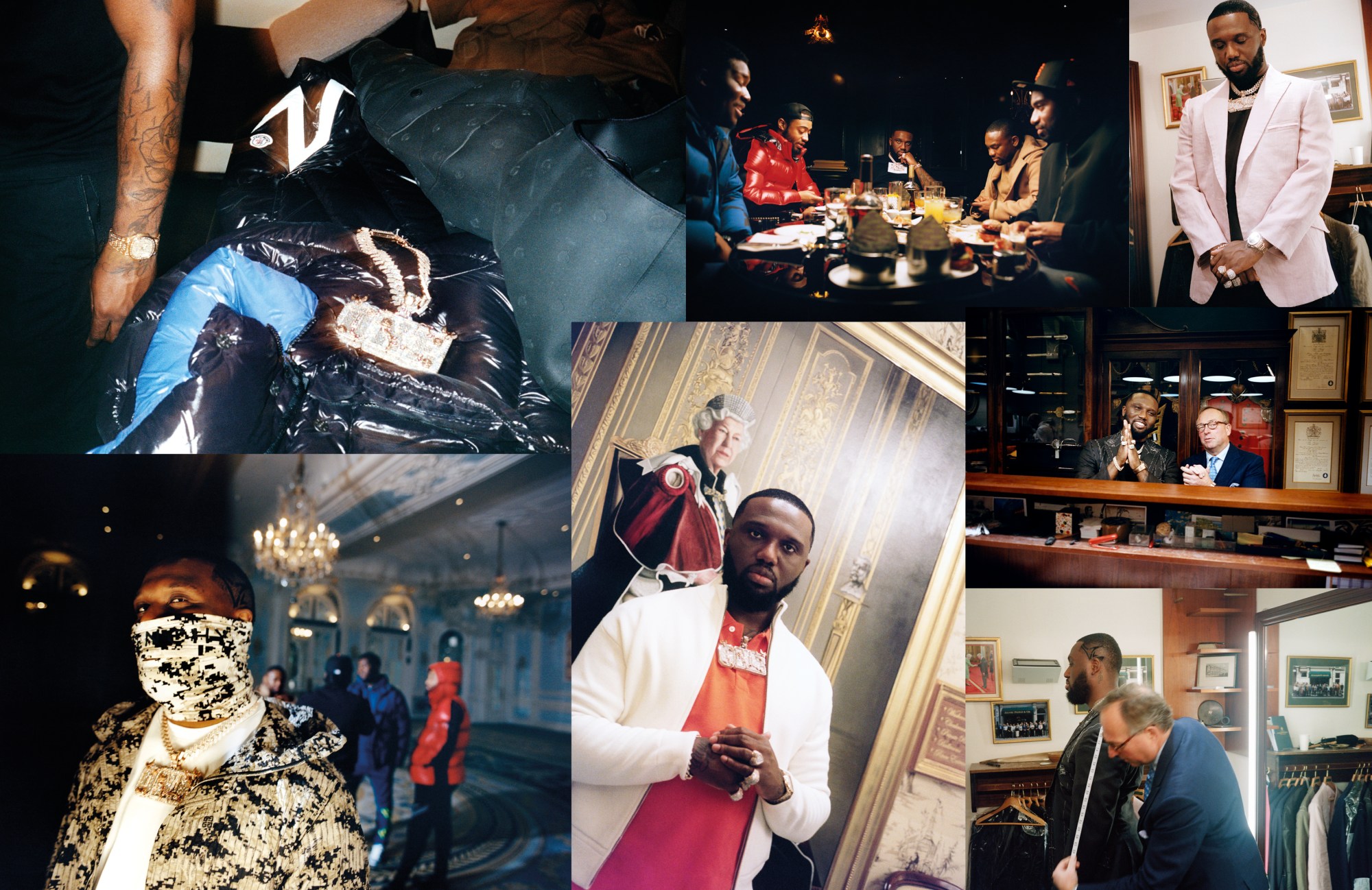
Skepta: Is it? Cold…
Headie: When I was ten, me and my older sister. She was misbehaving. I wasn’t a bad kid, I was just naughty. My sister was bad, though. So they told us we’re going on holiday for the summertime, just for three weeks. And then the day before we were meant to come back, they just asked me what school I wanted to go to.
Skepta: (Laughs) That’s mad. So, what kind of differences did you see there when you were younger? Obviously, you’re a superstar now but what about back then?
Headie: That was 2006 or something, and it wasn’t this place, like it is now, where everyone wants to be. No one wanted to be there then. I was upset to be there. My sister was even more upset. It showed me how privileged we are in England to have a lot of resources, because a lot of stuff that is normal for us was barely over there. And it forced me to be a lot more independent. I used to walk to school in Ghana, it was a 30-minute walk and we had to get there at six am. If you were late, you get beat. And you had to make sure your socks stayed white and that, or you got beat.
Skepta: I’d be getting mash up. How long did you do that? How long did you stay in Ghana for?
Headie: Eighteen months.
Skepta: Did you feel like that was an inspirational trip for you? Like, when you came back did you feel like what you saw in Ghana was one of the things that inspired you to do your thing?
Headie: Because of the age that I went, I was a bit immature. So I didn’t really feel motivated by it – it was more like I got left over there. When I came back, I was a man on a mis- sion to misbehave. I wanted to catch up on everything I was missing out on. I’m a very determined character, even I was determined to do bad stuff.
Skepta: One of the things we were talking about on the way here, in the car, was: what would you say is the craziest thing that you bought? Not, like, price-wise, but if you told some- one that you bought it they’ll be like, “Nah.” Or are you good with spending?
Headie: I’m terrible with spending. But I would say I’ve got an infatuation with tracksuits. Like, if I wear a tracksuit it’s euphoria. When I was young, I used to like tracksuits a lot. There was one guy who was from Tottenham, one of my old school bredrens called Cooly. I don’t know how he used to get them all, but he had the hardest tracksuits. I used to always want them but I couldn’t afford them. My pops couldn’t afford them either. So, when I started getting money, even before music, I would go and buy any tracksuit I could afford. The habit just followed me. I never check how much it’s going to cost.
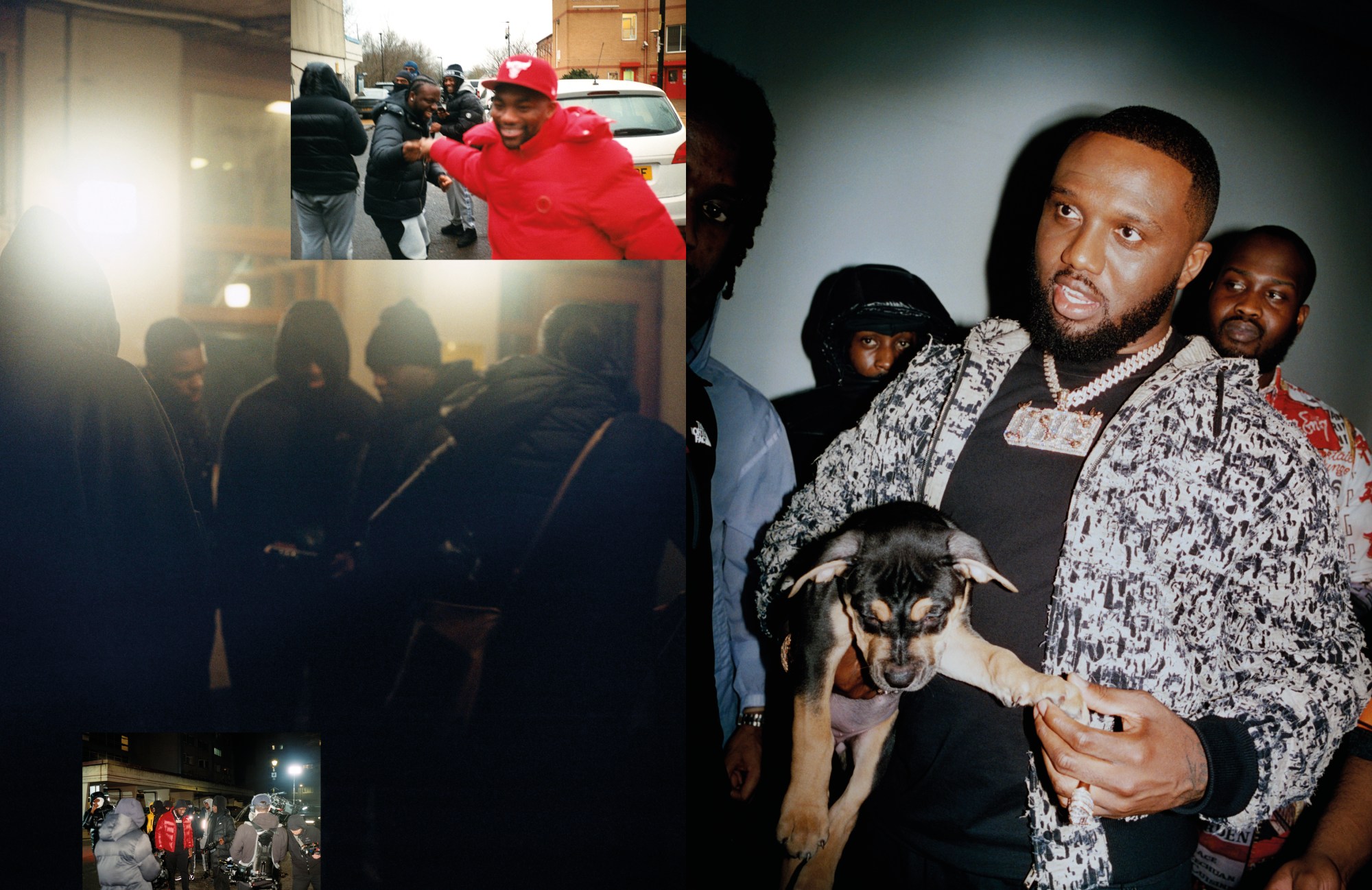
Skepta: You see how earlier on I was asking you a question and you were just joking around? You’ve got the humour of a weedman, but I’ve never seen you smoke. Do you?
Headie: I don’t smoke. I had a period when I smoked – when I was doing my first album, during lockdown, I was smoking a lot. But I think it was because it was lockdown, and there was nothing better to do. I’ve never really been a smoker like that, I didn’t learn how to bill it or nothing. Intentionally, though. Because when I was younger, my friends who smoked a lot, they just looked lost. And then I started to associate the majority of the heavy smokers with not being on point.
Skepta: I like what you said about billing it, though. Because I think about that sometimes. Every year it’s my New Year’s resolution to stop smoking. But sometimes I feel like when I roll it, when I bill it, that’s a creation to me. Making a spliff in the morning, sometimes before breakfast, that’s like making a beat. It takes the same skill: to sit there, have the patience, it’s like starting with the drums or whatever. And I always want that spliff to be better than the last one. It’s a proper thing to me. And I’m a hard roller. Everyone will tell you, Skep’s zoots are different. I’ve got Amsterdam skills. I could do pre-rolls. But I feel like, because I’m so hard at rolling, that’s probably a part of the reason why I like smoking. OK, so I see a lot of guys, they get their girlfriends and they go straight on Instagram with videos of them holding their bum, treating their girl like something they want to post. Or, they get a car, and they want to post it. Everything they do or get is straight on the Gram. I feel like you’re someone who keeps their private life out of things. Why is that?
Headie: I think one of the reasons I’ve built that mentality is because of the place that we come from. There are a lot of negative intentions, you get what I’m trying to say? You post your car and then you think, “Everybody knows what car I’m driving, and whoever doesn’t like me is going to be looking for my car.” It comes from there. Even though my mind isn’t always in that place, that’s where the attitude comes from. I wouldn’t post my house or anything, that’s crazy to me. And all of that stuff takes away from having something that’s for yourself. Man’s not really here for all that nonsense.
Skepta: I question whether those guys know if they’re doing it. Do they know that they’re baiting up their yard, their car, their peoples? You’re posting your girl; your girl must have a job somewhere. Do they not know, or are they willing to take the risk to look lit?
Headie: I think it’s the latter. I think that everyone’s got dif- ferent values, and some people don’t really value that peace of mind. But when we were growing up, that was the peace that everyone was chasing: to be able to have that freedom. So I feel like they don’t really value it like that.
Skepta: I honestly feel like that’s why I’ve survived for so long. I always have a mystery, I’m not about to show my yard. My yard’s mad, but I’m not going to post it. It’s just natural stuff to me. I wanted to ask you that so you can say to people that taking the risk for the clout, or the risk for the litness, is not worth something happening to you or your peoples. Do you have a Bible verse that you go to? If you’re feeling a way, is there one that is important to you?
Headie: Yeah, my favourite Bible verse is Psalm 35. My auntie showed it to me when I was a bit younger; every time she’d see I’m in trouble, or I’d be on a case or whatever, she would say to me, “Ah, make sure you read Psalm 35.” I’m a bit stubborn; I’m the kind of person who’ll forget if you tell me something that I don’t understand or don’t take seriously. But then I got in trouble quite a lot, so I became very familiar with it.
Skepta: Is it an uplifting kind of thing?
Headie: No, it’s about protection from people that are out to get you, from the people that want to bring you down.
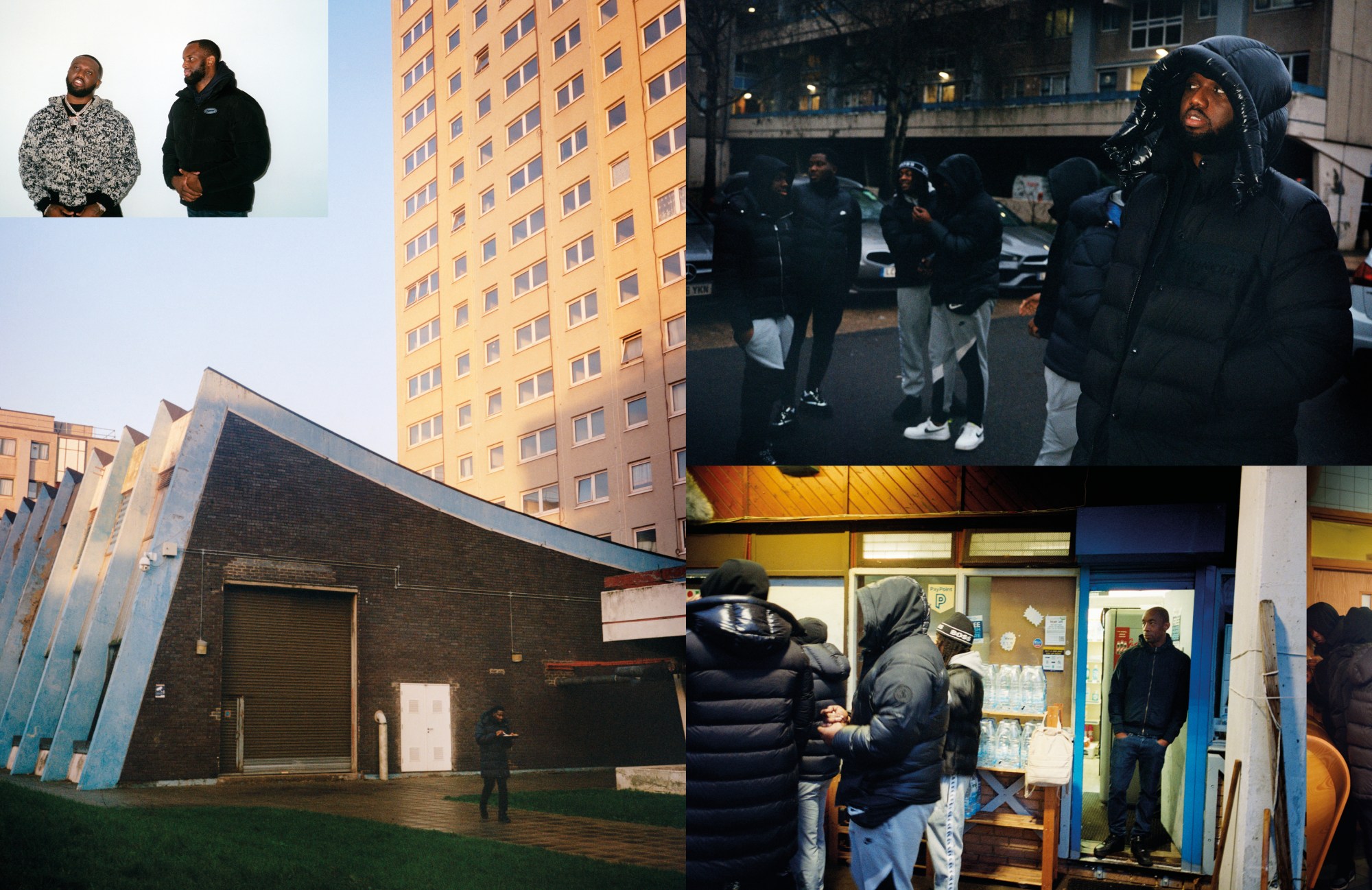
Skepta: Shout out to auntie then. I want to get into some music stuff now. Is OFB a label?
Headie: I would say OFB isn’t officially a label, but it basically is a label because it’s what everyone that comes up trying to do music from the hood associates themself with musically. So I feel like it’s a label for the hood.
Skepta: That’s hard. Do you think that you’d ever sign any- body that wasn’t from Farm? Could someone who wasn’t from Farm be OFB?
Headie: I’ve been thinking about that quite a lot. Me and the guys speak about this, and they’re open to me signing people from outside and bringing them on board. But when it’s people who I feel like I’ve come up with, who are younger than me and come from the same hood and are trying to do music, then I’d find it hard to cater to anyone else before them. The way my head goes naturally is towards the mandem. When it’s one of the young ones and I see them making an effort to do something positive, I want to uplift them.
Skepta: You’re one of – if not the biggest – crew in UK music. There’s a lot of members musically, and they’ve all got their own style and their own clout. They don’t ride off anyone else. It’s good, man. Anyway, how’s Martin?
Headie: He’s good. I spoke to him the other day. In that community, everyone’s talking about Martin and saying that he’s famous, that he’s going to be on TV and that. So he’s gassed. We patterned up his yard. I actually got him an interior designer… but you know a lot of the Martins, they’re hoarders, innit? So they don’t want to change their shit; he wants to be specific and keep the same carpet because he got it fifteen years ago from somewhere. So, we got it profes- sionally cleaned. Got him a new sofa. Him and his missus, they’re gassed. They’re good people.
Skepta: There’s something liberating in that full-circle moment. It’s good that you did it. It’s real and it’s honest, isn’t it? Are you working on a new album?
Headie: Yeah. It’s not finished yet, but it’s moving along swiftly.
Skepta: Anything you want to tell people about it?
Headie: I feel like a lot of people have mixed stories about me, or have different perspectives of me. I’ve made a lot of music that tells a story, but I feel like the stories are all separate and individual from each other. I’ve never told the full story, from start to finish, about how I came into music and how things were up until a certain point. That’s the story the album is telling: from when I first decided to start taking music seriously, the details of how things were and how things changed. That’s why Martin’s Sofa is one of the most important songs on the album.
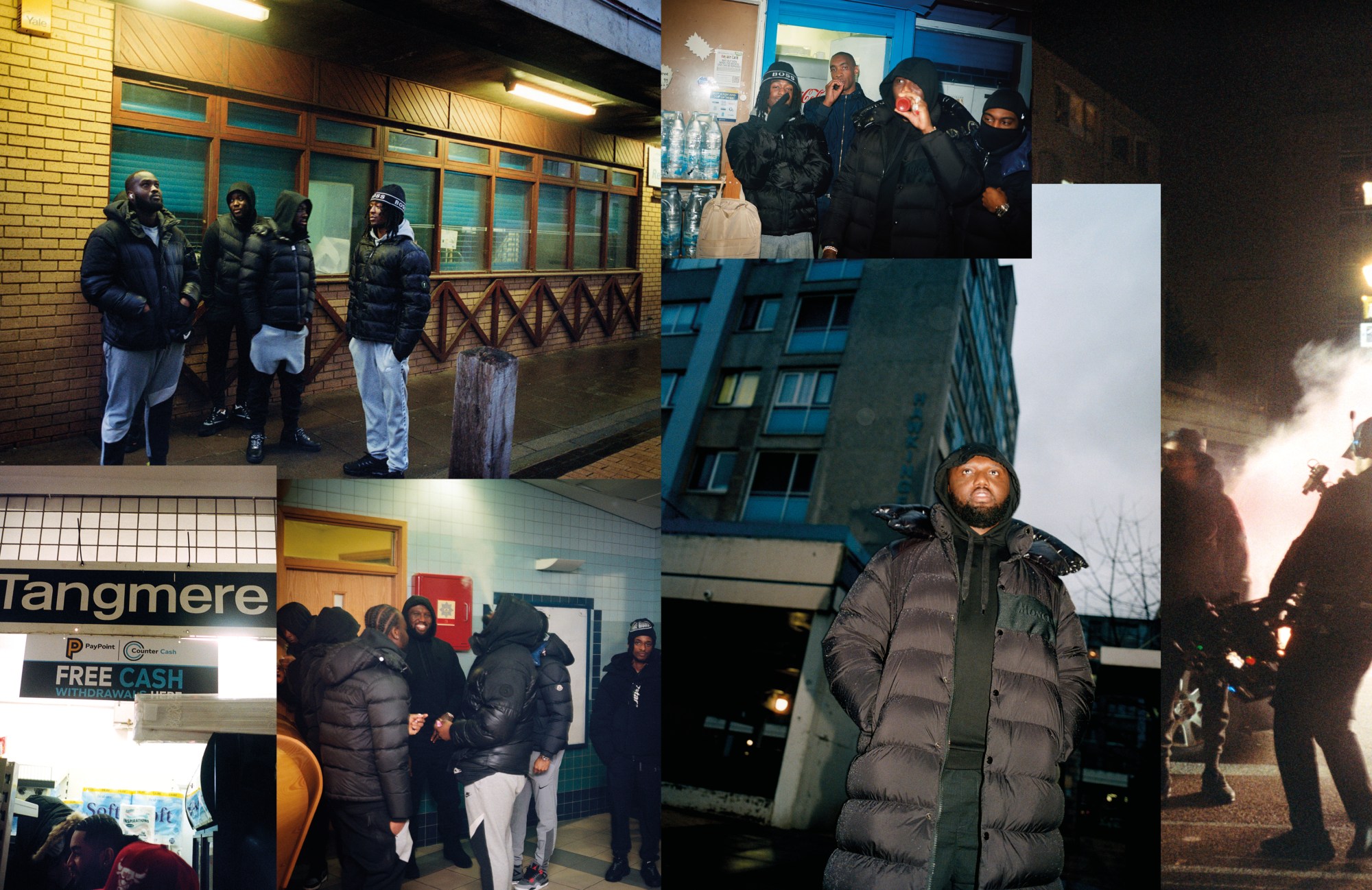
Skepta: I feel like, when you first start, you’re so hungry that when someone puts a beat on, you just want to destroy the beat. Then after that, when you hear the misconceptions and the things people say, you know it’s time to set it straight. Have you got a name yet?
Headie: I think I want to call it The Last One.
Skepta: What?! Why?
Headie: Because I feel like once I tell this story, I want to move on to some. lighter, nicer stuff. I want to take a step away after this album and start speaking more about how I want life to go from this point forward, and how it’s been more recently, rather than holding onto the past.
Skepta: You scared me with that title, though.
Olivia Singer: What was it that made you want to get into music?
Headie: When I was young, I didn’t think I wanted to be a musician. I used to write little lyrics when I was in secondary school and all that, but what made me actually want to get into music is that when I started going to jail a lot I had a lot of time on my hands. The first time I went to jail, I wrote a lot of lyrics – I don’t think I was that good at rapping, I never called myself a musician at that time, but I was trying to put together a project. Then, when I came out that time, I made a mixtape, burnt all the CDs myself, went onto Google and got the cover layout, made it on PowerPoint, folded it, glued it, and put the CDs in. I made like 40 of them and I gave them out to the mandem. But when I came back out on the block the next day, I saw one of the covers, drenched in a puddle. (Laughs)
Skepta: (Laughs) They just dashed it! Who had done it?
Headie: I’m thinking, rah, they didn’t even know that I’d printed that out on my printer, with my paper! Then the next guy, who I was working with at the time, I played it to him in the car when we were doing a long trip up North. And he was like, “This is shit man” and dashed it out the window. (Starts laughing) I feel like, even though the music probably wasn’t as good as it should have been, the process of putting it together taught me a lot about being a hard worker and being determined to finish something that you started. So then I got in a bit of trouble again, and went back to jail. And I got in trouble there, as well, so I had a lot of time to myself. But I had this rubbish radio, and I listened to a lot of radio and a lot of music. I had a G Eazy CD, and an old school Future one, Honest. And Styles P, French Montana. A lot of random CDs that I’d listen to the whole way through, and I’d rap over their songs. And that period of time is when I was improving my craft. Out of boredom, I wrote some plans down – like, I’m gonna make a studio, make a label, that kind of stuff. I came out and I didn’t last long before I went in again. But in that period of time, I actually got better at rapping. There was a lot of practice; I was there for nearly two years, rapping every day to myself in my cell. When I went back in after that short period of time, there was a guy I was rapping to who said, “actually if you come out with this flow, it’s not like anyone else”. Because I was listening to a lot of Future, I was trying to do a lot of melodies, but I was trying to do a drill flow as well. So, I was rapping on trap beats with a drill flow, and then I’d switch halfway into the melodies.
Skepta: And that’s how you found your style?
Headie: Yeah, that’s kind of how I fabricated it.
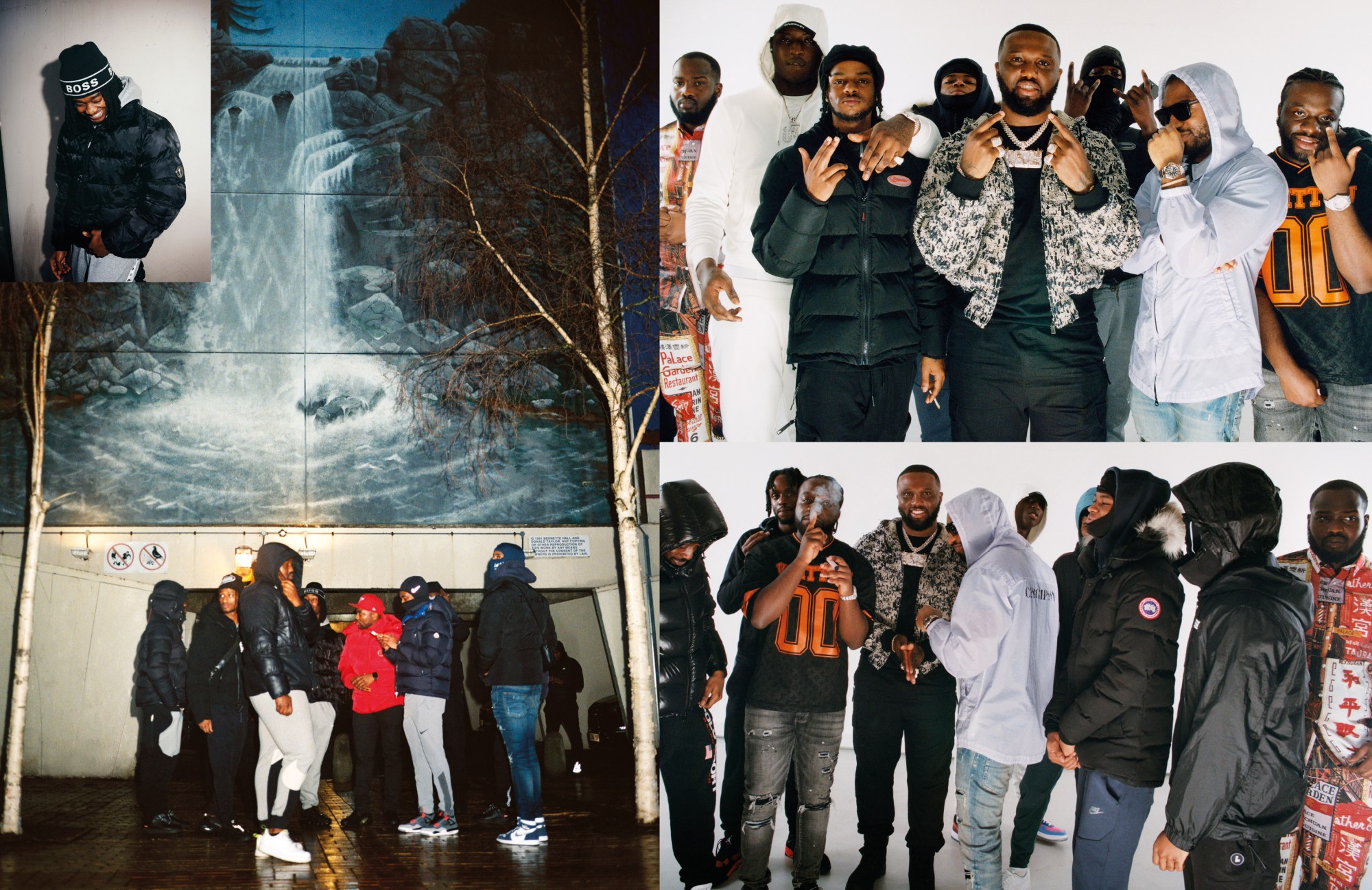
Olivia: Can you tell me how the two of you met? How long have you known each other?
Skepta: I’ve known of Headie for a long time, but we first kind of met around Back to Basics, when we made that together.
Olivia: What was it that interested you about what he was doing?
Skepta: I was really happy to see somebody else from Tottenham. I think Tottenham is full of talent because it’s such a dark place. We all have moments where we feel like there’s nothing left; everybody’s hit a super rock bottom in Tottenham. And it’s hard getting people on the same page
in Tottenham so sometimes you’ve got to do stuff on your own and inspire the rest to come with you. After so much came from Tottenham, I always used to think, “What’s next? What’s after Boy Better Know?” Then I heard Headie’s music and I was like, “This is sick.” Then I found out more about his persona online. Sometimes I like artists a lot, but then I follow them and realise, I don’t want this guy around me. I can like you from afar, think you’re hard, but don’t want to hang around with you. But I saw Headie and I just always thought, this guy is hilarious. Like it was just a natural Tottenham humour that we have. If you go to Tottenham, we talk in a way that’s so funny, and he had it. So I thought, whether I was gonna make a song with him, whether I was gonna follow him, I just wanted to tell him, “Bro, I see you and as much as your music is about the streets I hope you have your vision because you could take this to the craziest place. You could buy cribs for all your family. You could be on a holiday forever.” Then I met him and I realised, “Yeah, okay. He’s got his head screwed on.”
Olivia: We were talking the other day about that first Paris fashion week that Headie came to, about how much fun that was.
Skepta: When we went Louis (Vuitton)! My days. I brought my bredren for the first time! “Headie, it’s fashion week, come to Paris, let’s go and do this ting.” Then we got there, and there was this big basketball player in my seat and he’s not moving! I’m thinking, bruv, we will buss your head. (Laughing) But I’m not gonna do that because I don’t wanna make Headie think that we come to Paris and mash people up. That’s a bad example. So I’m trying to stay calm. I’m like, “Stay calm, Skep, man. Don’t set a bad example for Headie. Stay calm. Stay calm.”
I said, “Bro – I didn’t even know his name – You’re fighting over a chair at fashion week, do you know how crazy that is? You look mad.” That’s all I could say to him, that’s all I could muster up. After about ten seconds it sunk in a little bit, so he moved up a little bit. But there’s a lot of us. When I got the picture back, I could see none of our feet were on the floor and there was this big basketball player whose legs are spread out. With his feet touching the ground, making us look miniature. And then I had to laugh.
But I was happy that Virgil and Headie met, man, because Virgil always used to talk to me about Headie, tell me that he loves Headie One, that he played Headie’s tunes. So I said to Headie, “You gotta come meet him.”
Headie: It was a mad time, still. Because I didn’t know what to expect; I didn’t know what fashion week really meant. I didn’t know what was going on. It was the first time I’d seen anything like that.
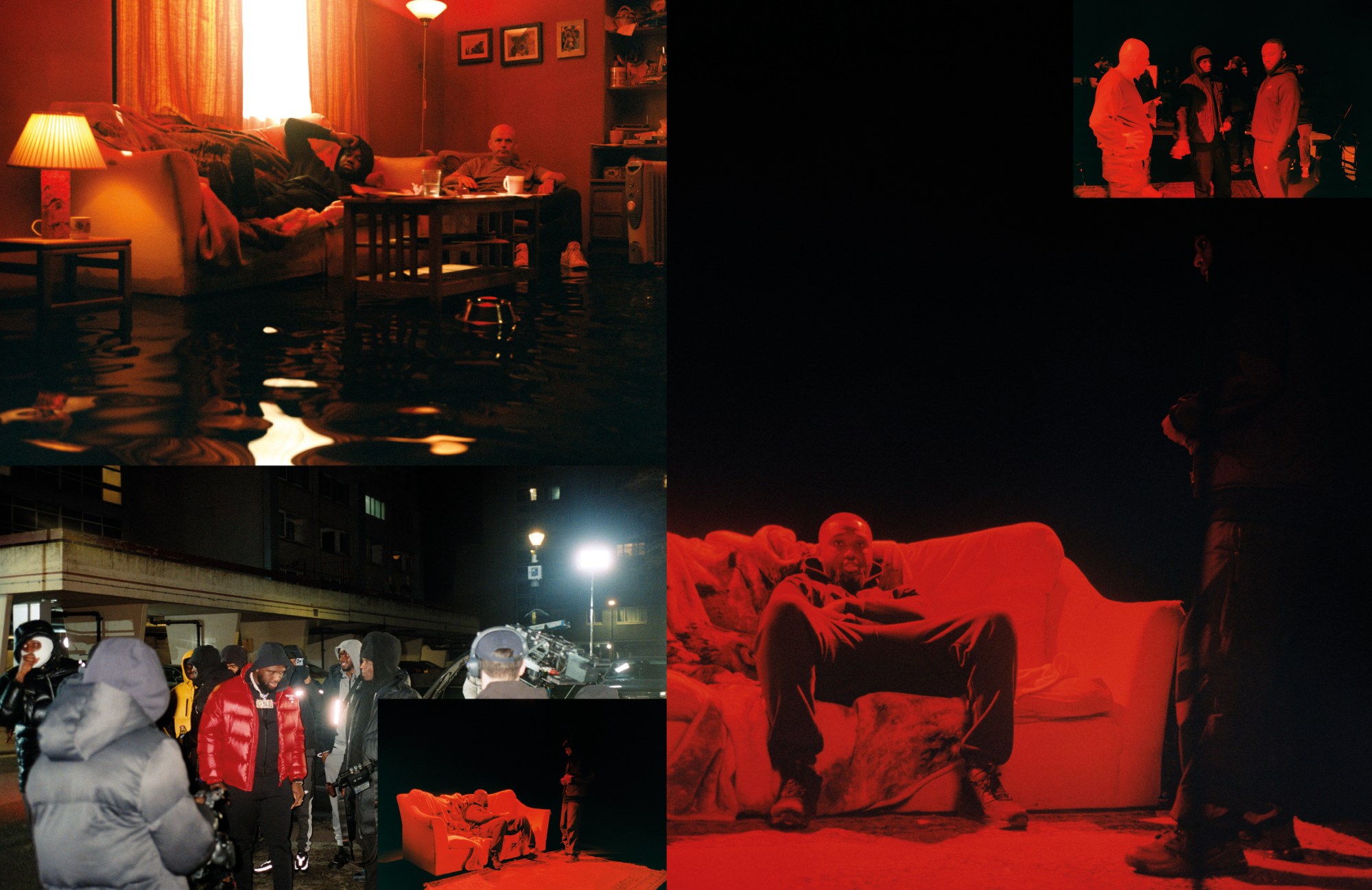
Olivia: Did you like it?
Headie: I like it, because it’s different. Doing music, you’re always in specific environments, but when I go to fashion weeks then I speak to different kinds of people, see different stuff. It expands your mind.
Skepta: When you’re from where we’re from, even if you’re successful and everyone’s telling you you’re great, it’s hard to see yourself. Like, people are saying I’m a superstar, but I’m not, I’m just a hood n*gga. But when you go fashion week, you see that not everyone’s slim with a six-pack, tall, dark and handsome. Everyone who’s there is at fashion week because of who they are. Everyone looks different, is differ- ent, and it’s okay to be yourself at fashion week; whereas, when you’re in this country, everyone’s trying to be the same. Everyone’s chasing to be this one thing. I remember when I first went to fashion week, I was like, “Fuck!” Some days I’ll be sitting in my house thinking, “How can I get a chain like an American,” or, “How can I get a whip like some rich French guy?” But then I go to fashion week and they like me because I’m Skepta. It’s liberating like, “Shit. When I go back to London, I’m just going to do me.” If that’s a pushbike and an English Bull Terrier, then I’m going to put that in my videos, because that’s me, that’s my world. Sometimes I see people and I see that they’re ready even though they don’t know they’re ready. Like how Headie doesn’t say he’s made it. But I know that he has. At this point, he just needs to feel it more. And fashion week will show you that.
Olivia: What does making it mean to you both, then?
Headie: I know they say there’s always going to be problems and that, but there are certain problems that I deal with at the moment that I feel like will be a lot easier to handle when I’ve made it. There’ll be no more negativity, and more togeth- erness on a wider scale. That’s why I said we were pushing in that direction, because a lot of people are trying to come together. I don’t feel like I can make it on my own. It’s never been my mission to make it alone. It’ll feel like I’ve made it when all of my people have made it.
Skepta: I think, to me, made it is when you have a choice. When I was younger and I was in the streets, that’s all I could do. People would tell me, “Oh, yeah, you can just stick to your music or whatever.” I’d be like, “Yeah, cool.” Like, obviously I could go to Heat FM, but that’s not paying me. People say mentally you’ve always got a choice, but sometimes it don’t feel like that: you ain’t got the opportunities, or the bread, or the headspace. I feel like I’ve made it now because I have the choice to either take my friends to do something bad, or there’s the possibility that we could do something great together instead. I think that’s what making it is. When someone says, “Yeah, man, you’re boss.” Yeah, I’m boss, and I could come and do badness tomorrow, but I have the choice to not. If you sat down in jail ten years ago, you’re sitting down in the cell like, “God, please help me because you know I was just out there trying a thing.” If I sat down in jail today, all I’m going to tell myself is, “Skep, you had a choice. Whatever you did, you had a choice to walk away and do the good thing.” And that’s why I think you’ve made it, Headie. Because you’ve got the choice.

Credits
Photography Bolade Banjo
Fashion Louis Prier Tisdall
Hair Amidat Giwa at Bryant Artists using Wella Professionals
Make-up Rebecca Wordingham at Bryant Artists using Dior Beauty
Photography assistance Adam Roberts and Bradley Polkinghorne
Fashion assistance Connie Ng and Charlotte Ghesquiere
Make-up assistance Tamsin Ballingall
Production Laura Galligan and Gracie Yabsley at LG Studios
Production assistance James Longville and Halima Walters
Casting director Samuel Ellis Scheinman for DMCASTING
